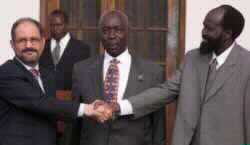How to share oil revenue and political power as well as agreeing on a cease-fire topped the agenda as representatives of the Sudanese government and rebels began another round of talks Monday to tackle some of the toughest issues at the root of their two-decade conflict.
Government and rebel officials expressed of optimism before the opening of the talks in the nearby town of Machakos, saying their biggest differences, such as the enforcement of Islamic law, or sharia, had already been dealt with in a July 20 framework agreement.
But the remaining issues are "very contentious," said Kenyan mediator Lt. Gen. Lazaro Sumbeiywo. "Somebody is going to lose a ministerial post ... somebody is going to have give up some power."
Although oil revenue was not an issue when the war began in 1983, it has "become another catalyst," Sumbeiywo said. "The wealth has to be divided."
Although exploration for oil was going on when the conflict erupted, production in the oilfields claimed by the southern Sudanese rebels did not begin until several years ago. Sudan now pumps about 250,000 barrels a day.
Samson Kwaje, the spokesman for the rebel Sudan People's Liberation Army, said the "most difficult issues have already been solved, this time it will be simpler."
Under the Machakos protocol, the Sudanese constitution would be rewritten to ensure Islamic law can be used in the north but would not infringe on the rights of non-Muslims in the north or south. Most people in the south follow traditional beliefs, but 5 to 10 percent are Christians.
It was also agreed that six years after a full peace agreement is signed, people in southern Sudan would vote whether to remain in Sudan or secede.
But in the July 20 protocol, "the relationship between the state and religion is ambiguous ... the issue will remain a live one until an agreement is reached on a constitution for the central government that is neutral on religion," said John Prendergast, an Africa specialist at the International Crisis Group. The civil war broke out in 1983 when the rebels took up arms against the predominantly Arab Muslim government in an attempt to obtain autonomy for the south.
An estimated 2 million people have been killed during the conflict, mainly through war-induced famine, and another 4 million have been forced to flee their homes.
The fighting has intensified in recent years as foreign companies began drilling for oil in central Sudan. The government appears to have taken the upper hand with more sophisticated equipment in fighting near the oil fields, and the rebels have lost ground around.
The United States, Britain, Norway and Italy - members of an observer group at the talks - have put pressure on both the government and the rebels to make peace.
Late last year, President George W. Bush's special envoy, John Danforth, negotiated a cease-fire in the central Nuba mountains which has largely held.
But fighting has continued in other areas of southern Sudan, especially near oil fields around Bentiu, 1,000 kilometers (620 miles) south of Khartoum. And since the the protocol was signed, both the government and rebels have accused each other of launching fresh attacks.
Kwaje said the recent fighting shouldn't affect the talks - "we both realize that a cease-fire will come when we reach a comprehensive agreement."
Government official don't appear to share that view.
"We do not feel that the (framework agreement) is secure enough ... fighting is still going on in some parts of the country " Ad'DDirdeiry Mohamed Ahmed, Sudan's ambassador to Kenya, was quoted as saying Saturday in the East African Standard newspaper. "That is why the government is always appealing and pleading with the (rebels) to accept a semblance of a cease-fire."
PHOTO CAPTION
President Daniel Arap Moi of Kenya (C) looks on as envoys from Sudan's warring factions shake hands in Nairobi, July 20,2002. Commander Salva Kiir (R) from the rebel Sudan People's Liberation Movement (SPLM) and Sudan's presidential peace adviser Ghazi Salah al-Din (L) said on Saturday they had made a major breakthrough in talks to resolve the 19-year-old conflict and hoped to sign a comprehensive peace deal after further talks in August this year. REUTERS/Antony Njuguna
- Author:
& News Agencies - Section:
WORLD HEADLINES


 Home
Home Discover Islam
Discover Islam Quran Recitations
Quran Recitations Lectures
Lectures
 Fatwa
Fatwa Articles
Articles Fiqh
Fiqh E-Books
E-Books Boys & Girls
Boys & Girls  Ramadan
Ramadan Fatwa Audios
Fatwa Audios Month of Mercy
Month of Mercy Women
Women Eed Al- Fitr
Eed Al- Fitr Food Recipes
Food Recipes Videos
Videos

 Prayer Times
Prayer Times












